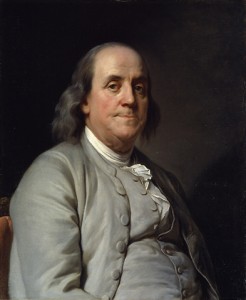
Summary: Happiness and virtue have been theorized to be linked for millennia.
- Identifying one's own values and documenting them so they can be tracked could be an effective way to address personal happiness and professional success.
Benjamin Franklin was known for being very industrious, inventive and original. As a boy he lived in a modest situation financially and had to leave school at the age of ten, but allowed his keen interest in publishing and writing to lead him into an adult life with many interests and social connections.
One of those interests was self-efficacy or how effective he was on any given day. To the end of measuring his productivity and attentiveness he created a self-evaluation system. He listed 13 virtues he wished to cultivate within himself and kept track of his progress in achieving them.
"I grew convinced that truth, sincerity, and integrity in dealings between man and man were of the utmost importance to the felicity of life; and I formed written resolutions, which still remain in my journal book, to practice them ever while I lived. Revelation had indeed no weight with me, as such; but I entertained an opinion that, though certain actions might not be bad because they were forbidden by it, or good because it commanded them, yet probably these actions might be forbidden because they were bad for us, or commanded because they were beneficial to us, in our own natures, all the circumstances of things considered. (Source: Plattsburgh.edu)
The key word in his quote appears to be felicity, which has been defined as a prolonged happiness, or contentment. One may contrast felicity with the happiness associated with pleasure, which typically doesn't last very long. Franklin's notion that virtue is central to happiness was not new. It may be traced back to Aristotle, who described happiness, "as activity of the soul in accordance with virtue." (Source: Trinity.edu)
The fact Aristotle predated Franklin about 2,000 years, but both men had a similar outlook on the relationship between happiness and the practice of virtue at least suggests the relationship is something all people can appreciate, regardless of time.
One belief currently floating around within modern, capitalistic societies is that happiness follows material success. However, a recent survey of relevant research studies found it was actually happiness that lead to success, not the other way around.
So it appears Franklin and Aristotle's views that personal responsibility and the daily presence of virtue were and continue to be accurate perceptions on how happiness is generated and maintained. To see a list of Franklin's virtues, visit the PBS site.
Image Credit: Public Domain